EU farm subsidy delay statementpublished at 14:03 BST 31 May 2016
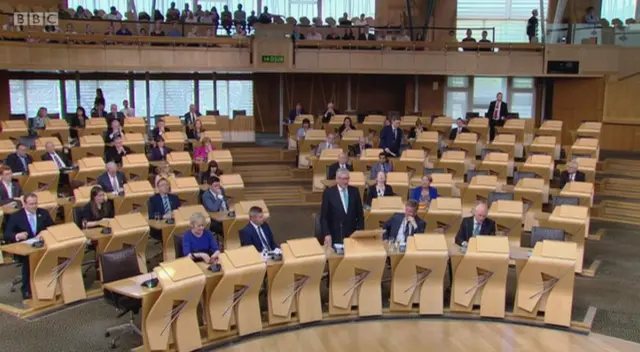
Rural Affairs Secretary Fergus Ewing will now give a ministerial statement on the EU farm subsidy delays.
PLEASE SCROLL DOWN FOR TEXT COVERAGE
Rural Economy Secretary Fergus Ewing apologises for EU farm payments delays
Economy Secretary Keith Brown outlines government plans for Scottish economy
Opposition parties raise questions about the memorandum of understanding that Nicola Sturgeon signed with Chinese firms
Craig Hutchison and Colin Bell

Rural Affairs Secretary Fergus Ewing will now give a ministerial statement on the EU farm subsidy delays.
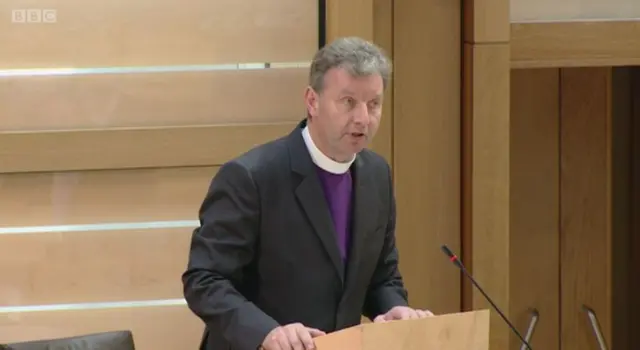
We begin this afternoon with the first Time for Reflection of the parliamentary session.

It will be delivered by Reverend Neil Gardner who is minister at Edinburgh's Canongate Kirk.
The Scottish government should "get to grips" with a "calamitous" attempt to reform agricultural payments, according to NFU Scotland.
The union said a "damning report" from the auditor general into the programme showed it may never be fit for purpose.
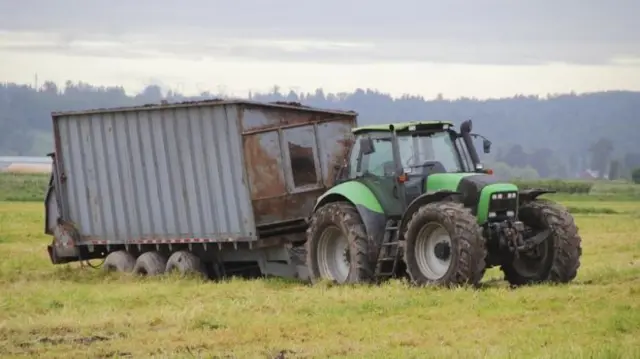 Image source, Thinkstock
Image source, ThinkstockAudit Scotland said farmers had faced "lengthy delays" to payments
Audit Scotland has highlighted "serious cost and operational issues".
The Scottish government said it was focused on paying crofters and farmers before the 30 June deadline.
The cost of the government programme was originally estimated to be £102m, but it now has a final budget of £178m and a reduced scope.
Scottish Labour have described the project as a "catastrophic IT failure", while the Conservatives said the government had "taken their eye off the ball" and failed rural communities.
The Scottish Greens have said the IT shambles was "inexcusable" given the importance of the industry to Scotland.
Auditor General Caroline Gardner's report also highlights a conflict of interest within the leadership team of the programme, revealed by a BBC investigation in March.
BBC Scotland found that a former delivery director of the project, Dominic Prabhu, had supplied dozens of contractors from his own company to work on the programme.
 Image source, Thinkstock
Image source, ThinkstockDozens of IT contractors working on the project were supplied by the programme's former delivery director
His company Spectromax Solutions saw its assets soar last year - from about £81,000 in 2014 to about £3.5m in 2015.
Dr Prabhu has denied there was a conflict of interest.
Quote Message"The CAP Futures programme has been beset with difficulties from the start. These problems, and the way they have been dealt with by the Scottish government, are a serious concern, particularly as the programme continues to face major obstacles and is unlikely to deliver value for money.
Caroline Gardner, Auditor General
Quote Message"The scale of the challenge ahead should not be underestimated. It's vital that the Scottish government take steps now to ensure the IT system is fit for purpose, and fully assess the potential financial impact if it's unable to meet the Commission's regulations within the programme's remaining budget."
Caroline Gardner, Auditor General for Scotland
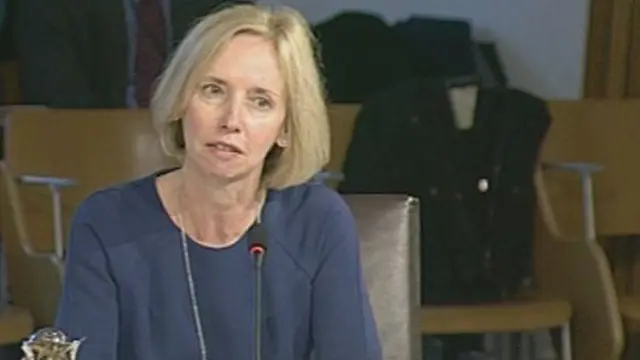 Image source, bbc
Image source, bbcAuditor General for Scotland Caroline Gardner
Audit Scotland, external has highlighted "serious cost and operational issues" around the Scottish government's attempt to reform agricultural payments, in a report published earlier this month, external.
The Scottish government said it was focused on paying crofters and farmers before the 30 June deadline.
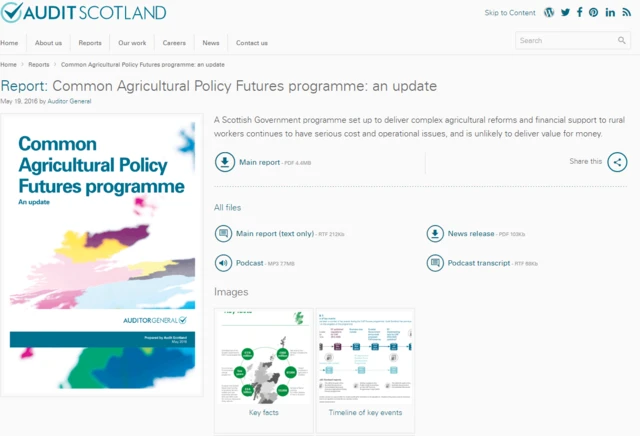 Image source, Audit Scotland
Image source, Audit ScotlandAudit Scotland
If the system does not meet European Commission regulations by that date, the Scottish government could face a penalty of between £40m and £125m.
Under the Common Agricultural Policy (CAP), about £4.6bn in European and Scottish government funding will be paid out between 2015 and 2020.
The CAP Futures programme in Scotland was meant to make the rural payment process more efficient.
Earlier this month a senior European official met Nicola Sturgeon to discuss delays to EU farming subsidy payments.
Phil Hogan, the EU's agriculture commissioner, said he wanted to help Scotland get the money to farmers as quickly as possible.
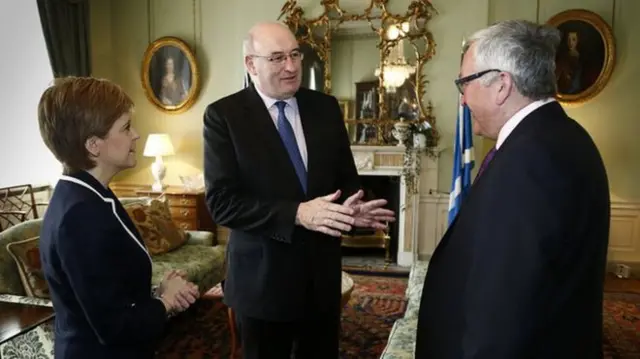 Image source, Scottish government
Image source, Scottish governmentThe Scottish government said the meeting between Mr Hogan (centre), Ms Sturgeon and Mr Ewing had been "very positive"
Only about 80% of Scottish farmers have so far received their Common Agricultural Policy (CAP) payments.
The Audit Scotland watchdog has said problems with a new Scottish government IT system were largely to blame.
Mr Hogan discussed the issues with First Minister Nicola Sturgeon and her new rural economy secretary, Fergus Ewing, at Bute House in Edinburgh.
A spokeswoman for the Scottish government said: "It was a good discussion and the first minister and Mr Ewing found the meeting with the commissioner to be very positive."
The EU hands responsibility for paying out the EU farming subsidy payments to national and regional governments, including Scotland - which is due to receive about £5.8bn in CAP Futures funding over the next six years.
The money is mainly given to improve agricultural productivity and to ensure farmers have a reliable source of income.
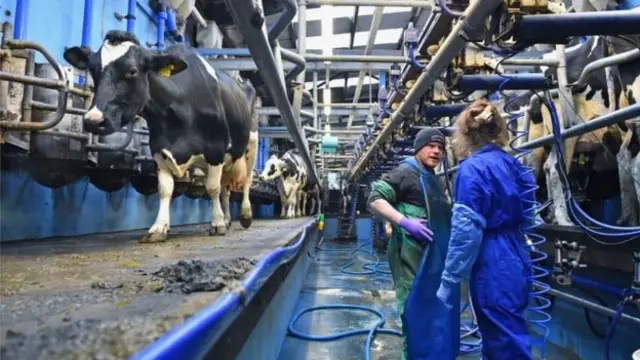 Image source, Getty Images
Image source, Getty ImagesAbout a fifth of Scotland farmers have not yet received any CAP Futures money from the Scottish government
Farming union NFU Scotland has called on the Scottish government to "get to grips" with its "calamitous" attempts to distribute the money, with about a fifth of farmers still not having received anything.
The Scottish government has said it is keeping a tight rein on activity, costs and risks, to secure the best value it can for the taxpayer.
The government faces fines of between £40m and £125m if farmers are not paid by the 30 June deadline.
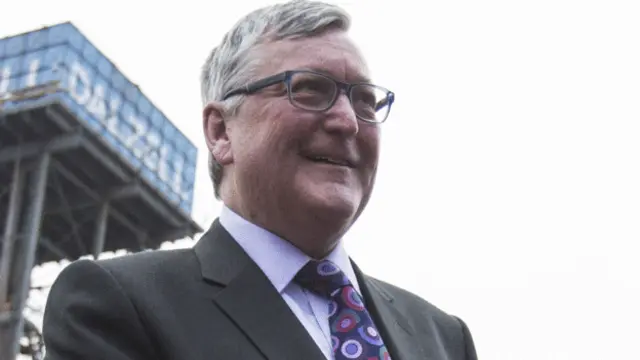 Image source, bbc
Image source, bbcRural Economy Secretary Fergus Ewing
The Scottish government has been urged not to sweep problems surrounding EU payments to farmers "under the carpet".
Ahead of the ministerial statement at around 2.05pm, Scottish Labour said the handling of the process had been "chaotic and shambolic".
Payments had been affected by major issues with a £178m IT system set up in Scotland to administer the new Common Agricultural Policy (CAP) payments.
New Rural Economy Secretary Fergus Ewing has admitted that the CAP payments have not been made quickly enough and he will outline the government's plans to rectify the problem.
After the Common Agricultural Payments statement, Economy Secretary Keith Brown will lead a debate focusing on Scotland's economy from around 2.30pm.
The debate is formally entitled 'Taking Scotland Forward - Scotland's Economy, Short Term Resilience and Long Term Opportunities'.
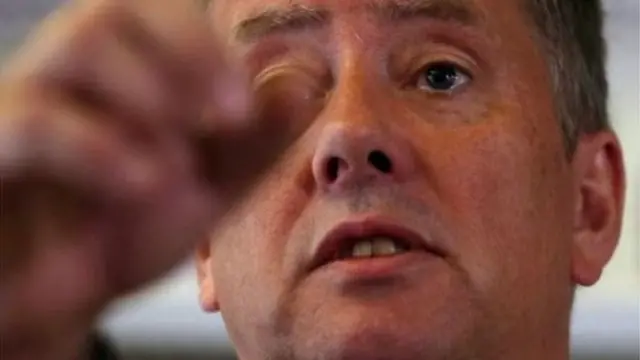 Image source, PA
Image source, PAEconomy Secretary Keith Brown
The new economy secretary, a new dedicated cabinet role introduced by Nicola Sturgeon in her cabinet reshuffle, is expected to say Scotland can become a more productive country through “innovation, investment, internationalisation and tackling inequality”.
Mr Brown will not only continue to oversee infrastructure projects, but he will be securing investment and supporting people into work, similar to the UK government's business secretary.
The first minister had previously said creating two finance roles was not a reflection on how the one job had been carried out in the past, but rather a "reflection of the challenges and opportunities we face in the future".
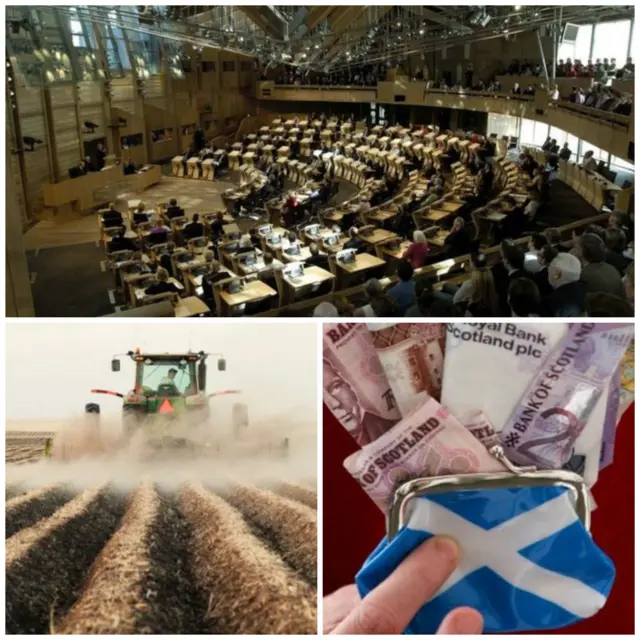 Image source, Thinkstock, Scottish Parliament, PA
Image source, Thinkstock, Scottish Parliament, PACAP payments and the economy dominate the chabmer this afternoon
Good afternoon and welcome to Holyrood Live's coverage of the Scottish Parliament on 31 May 2016.
New Rural Affairs Secretary Fergus Ewing will give a statement on the delayed CAP payments and then MSPs will debate the economy.